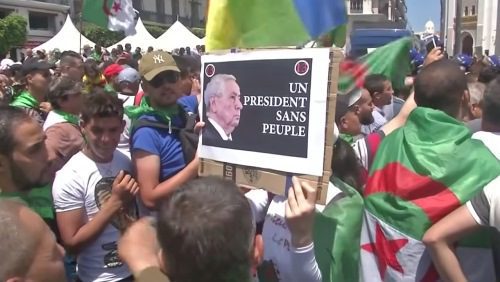The government has not shied away from arguments convincing Algerians to participate massively in Thursday’s presidential election.
By Lemine Ould M. Salem
However, no matter how Algerians react to the vote, we cant blame everything on the strongman of Algiers, General Gaïd Salah, Chief of the Defence Staff and Deputy Minister of Defence for not having done everything possible to encourage their compatriots to participate in the presidential elections.
Through televised speeches addressed to the general public and meetings with the various state bodies, the head of the Algerian army did not skip the arguments for Algerians to participate massively in this election which, according to him, would be the “irrevocable completion of the path of November 1, 1954,” the date of the outbreak of the national liberation war which would lead to the country’s independence in 1962.
General Salah’s repeated calls for votes reflect a deep concern about seeing the exercise turned into a fiasco when he personally wants to “normalize” the presidency after the forced resignation of President Abdelaziz Bouteflika.
Imposed without consultation with its opponents, the rationale behind calling the election is strongly contested by a large section of Algerian society.
Since February 22, thousands have been demonstrating every Friday after congreational prayer calling for a “true democratic transition” that would dismantle the system in power since independence, all over this vast country of forty million inhabitants.
Organised within the framework of a Hirak (movement in Arabic), the Algerians had initially taken to the streets to protest the candidacy for a fifth term which was then envisaged by President Bouteflika whose state of health was clearly incompatible with the function of head of state.
After several weeks of peaceful demonstrations, the Hirak had achieved its first victory on March 26th, the day Bouteflika was ousted by the army.
Its leader, General Gaïd Salah, who was previously considered close to the ousted president, obliged the Constitutional Council to declare that the head of state is unable to act and to apply the provisions of the constitution in this case.
Abdelkader Bensalah, President of the Senate took over from him.
But the Hirak doesn’t want a figure linked to the deposed president.
Better still, it called for the resignation of all the figures of the Bouteflika era and beyond tha the dismantling of the entire power system in place since independence.
The army believes it can calm the situation down by ordering the arrest of the main figures of the deposed president’s regime: former ministers, councillors, business overlords, close figures, company directors, Bouteflika’s family circle among others/
The purge is massive but it didn’t placate the demonstrators.
In June, the Hirak bagged a second victory.
Under his pressure, the presidential election scheduled for July 4 was cancelled by the Constitutional Council, which lamented “the impossibility of holding the election” and delayed it.
Two months later, General Salah set a new timetable.
This time, he seemed determined to press ahead with his agenda to its logical conclusion.
Under his influence, Abdelkader Bensalah, the interim president, signed the decree convening the Electoral College and set the presidential election for December 12.
This time, 23 candidates submitted their applications to the independent national electoral authority in charge of organising the election.
Only five were selected: former Prime Ministers Abdelmadjid Tebboune and Ali Benflis, former Minister of Culture Azzeddine Mihoubi, former Minister of Tourism Abdelkader Bengrina and Abdelaziz Belaïd, President of el Moustakbal Front.
All of them have one thing in common.
They are all collaborators or allies of President Bouteflika.
LOS/te/lb/as/APA


